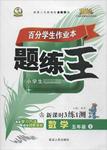题目内容
There me two maps on the wall: one is a map of China, and ______ is a map of the world.
- A.other
- B.another
- C.the other
- D.the others
本题考查对习惯搭配用法的掌握。泛指另一个用another;一定范围内两人 (物),一个用one,另一个用the other;一定范围内三者,一个用one,另一个用one (another),第三个可用the other,a third;一定范围内,除去一部分人/物,剩余的全部用the others;泛指别的人或物时,用others;当在一定范围内,除去一部分后,剩余部分但不是全部时,也用others。

 世纪百通优练测系列答案
世纪百通优练测系列答案 百分学生作业本题练王系列答案
百分学生作业本题练王系列答案Watching some children trying to catch butterflies one hot August afternoon, I was reminded of an incident in my own childhood. When I was a boy of 12 in South Carolina, something happened to me that cured me forever of wanting to put any wild creature in a cage.
We lived on the edge of a wood, and every evening at dusk the mockingbirds would come and rest in the tree and sing. There isn’t a musical instrument made by man that can produce a more beautiful sound than the song of the mockingbird.
I decided that I would catch a young bird and keep it in a cage and that way have my own private musician.
I finally succeeded in catching one and put it in a cage. At first, in its fright at being captured, the bird fluttered about the cage, but eventually it settled down in its new home, I felt very pleased with myself and looked forward to some beautiful singing from my tiny musician.
I had left the cage out on our back porch(门廊), and on the second day of the bird’s captivity my new pet’s mother flew to the cage with food in her mouth . The baby bird ate everything she brought to it. I was pleased to see this. Certainly the mother knew better than I how to feed her baby.
The following morning when I went to see how my captive was doing, I discovered it on the floor of the cage, dead. I was shocked! What had happened? I had taken excellent care of my little bird, or so I thought.
Arthur Wayne, the famous ornithologist, happened to be visiting my father at the time and, hearing me crying over the death of my bird, explained what had occurred: “A mother mockingbird, finding her young in a cage, will sometimes bring it poison berries. She thinks it better for her young to die than to live in captivity.”
Never since then have I caught any living creature and put it in a cage. All living creatures have a right to live free.
【小题1】The boy caught a mockingbird because___________.
| A.he wanted a pet for a companion |
| B.he liked its beautiful feather |
| C.he wanted it to sing for him |
| D.he had just got a cage |
| A.it ate some poisonous food the boy gave it by mistake |
| B.it ate the poisonous food its mother gave it |
| C.it was frightened to death |
| D.it refused to eat anything |
| A.a religious person |
| B.a kind and sympathetic person |
| C.a schoolmaster |
| D.an expert in birds |
| A.birds put in a cage won’t live long |
| B.you have to be very careful about the food you give to young birds |
| C.when you capture a young mockingbird, you should keep it away from its mother |
| D.freedom is valuable to all living creature. |
This is the letter that Mr. White wrote before his death about his three books for children:
Dear Reader:
I receive many letters from children and can't answer them all -- there wouldn't be time enough in a day. That is why I am sending you this printed reply to your letter. I'll try to answer some of the questions that are commonly asked.
Where did I get the idea for Stuart Little and for Charlotte's Web? Well, many years ago I went to bed one night in a railway sleeping car, and during the night I dreamed about a tiny boy who acted rather like a mouse. That's how the story of Stuart Little got started.
As for Charlotte's Web, I like animals and my barn(谷仓) is a very pleasant place to be, at all hours. One day when I was on my way to feed the pig, I began feeling sorry for the pig because, like most pigs, he was doomed to die. This made me sad. So I started thinking of ways to save a pig's life. I had been watching a big grey spider at her work and was impressed by how clever she was at weaving. Gradually I worked the spider into the story that you know, a story of friendship and salvation(拯救) on a farm. Three years after I started writing it, it was published. (I am not a fast worker, as you can see.)
Sometimes I'm asked how old I was when I started to write, and what made me want to write. I started early -- as soon as I could spell. In fact, I can't remember any time in my life when I wasn't busy writing. I don't know what caused me to do it, or why I enjoyed it, but I think children often find pleasure and satisfaction is trying to set their thoughts down on paper, either in words or in pictures. I was no good at drawing, so I used words instead. As I grew older, I found that writing can be a way of earning a living.
Some of my readers want me to visit their school. Some want me to send a picture, or an autograph, or a book. And some ask questions about my family and my animals and my pets. Much as I'd like to, I can't go visiting. I can't send books, either -- you can find them in a bookstore or a library. Many children assume that a writer owns (or even makes) his own books. This is not true -- books are made by the publisher. If a writer wants a copy, he must buy it. That's why I can't send books. And I do not send autographs(亲笔签名,手稿) -- I leave that to the movie stars. I live most of the year in the country, in New England. From our windows we can look out at the sea and the mountains. I live near my married son and three grandchildren.
Are my stories true, you ask? No, they are imaginary tales, containing fantastic characters and events. In real life, a family doesn't have a child who looks like a mouse; in real life, a spider doesn't spin words in her web. In real life, a swan doesn't blow a trumpet(喇叭,小号) . But real life is only one kind of life -- there is also the life of the imagination. And although my stories are imaginary, I like to think that there is some truth in them, too -- truth about the way people and animals feel and think and act.
Yours sincerely,
E.B. White
1.What does the author do?
|
A. a writer |
B.a reporter |
C.a doctor |
D.a teacher |
2.What caused the author start to write?
|
A.His parents’ encuoragement |
|
B.His talent in writing |
|
C.Not mentioned in the passage |
|
D.A writer in the early time |
3.Why does the author think he can’t seng his autographs?
|
A.Because he thinks it should be dong by movie stars. |
|
B.Because he thinks his writing is not good enough |
|
C.Because he has no much time |
|
D.Because he hates writing |
4.How long had the author been writing the story of Chariotte’s web?
|
A.3 minths |
B.2 years |
C.3 years |
D.5 years |
完型填空 (共20小题;每小题1分,满分20分)
A Fool’s Day falls on 1st of April. People _31_forget the significance (意义) of the day.
In March 1980, I was 32at Durham University with seven other Chinese students. I had 33 to go to another university after graduation and had 34 application (申请) forms to several 35 . Every morning I arrived at the porter’s office (传达室) and waited my fate. But no 36 came.
On April 1st, as I was eating my 37 , Huang came in , with a toothbrush(牙刷) 38 in his hand. 39 fearing that he might forget the important news , he passed me the 40 . “Morning , Wu,” he said , “I saw Mr. G this morning. He told me that a letter had arrived in his office for you from Manchester University, and asked you to go and get it 41 possible.” I jumped with 42 .
I even didn’t 43 my breakfast and rushed to Mr. G’s office but he wasn’t 44 . I then went to the secretary’s room and 45 everything to her. She opened Mr. G’s room. I looked at everything. There didn’t seem to be a letter for me. “If he had asked you to pick it up from here,” said the secretary , “ he would have put it in 46 or simply left it to me.”
Greatly 47 , I walked out of the room and 48 the secretary lock it. 49 the secretary’s eyes 50 . “Sorry,” she said. “It’s April Fool’s Day!”
1.A sometimes B. never C. always D. seldom
|
2. |
|
|
3. |
|
|
4. |
|
|
5. |
|
|
6. |
|
|
7. |
|
|
8. |
|
|
9. |
|
|
10. |
|
|
11. |
|
|
12. |
|
|
13. |
|
|
14. |
|
|
15. |
|
|
16. |
|
|
17. |
|
|
18. |
|
|
19. |
|
|
20. |
|